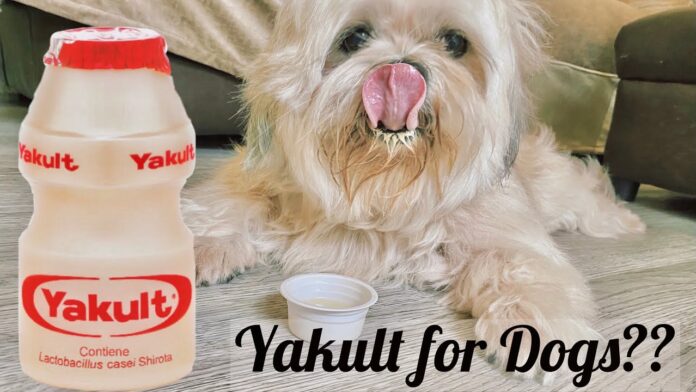Hey there fellow pet parents! Ever wondered if your four-legged bestie can share your favorite probiotic drink? Today, we’re gonna dive deep into the world of Yakult for dogs and figure out if it’s a yay or nay for our furry friends.
The Quick Answer (For Busy Pet Parents)
TL;DR: While Yakult isn’t toxic for dogs, it’s not the best choice for their probiotic needs. There are better, dog-specific alternatives available!
What’s Actually in Yakult?
Before we get too excited about sharing our Yakult with our pups let’s break down what’s inside this tiny bottle
- Water
- Sugar (lots of it!)
- Skim milk
- Lactobacillus casei strain Shirota
- Some artificial flavors
- Glucose-fructose syrup
Why People Are Asking About Yakult for Dogs
Listen up, fam! There’s been a lot of buzz about giving Yakult to dogs, and I totally get why:
- Probiotics are super trendy right now
- We love sharing good stuff with our pets
- Some dogs have tummy troubles that need fixing
The Good, The Bad, and The Ugly Truth
The Good Stuff
- Probiotics can benefit dogs’ digestive health
- Contains calcium from milk
- Most dogs find it tasty (duh, it’s sweet!)
The Not-So-Good Stuff
-
Too Much Sugar
- One tiny bottle contains about 11g of sugar
- That’s way too much for our furry friends
- Can lead to weight gain and dental problems
-
Lactose Issues
- Many dogs are lactose intolerant
- Might cause upset tummy
- Diarrhea? No thanks!
-
Wrong Probiotic Strain
- Dogs need specific probiotic strains
- Yakult’s strain isn’t optimized for canine guts
- It’s like using a phone charger with the wrong plug!
What Might Happen If Your Dog Drinks Yakult
So your curious pupper managed to snag a bottle? Here’s what could happen:
- Mild stomach upset
- Gas (prepare your nose!)
- Loose stools
- Temporary lactose intolerance symptoms
- Sugar rush followed by energy crash
Better Alternatives for Your Dog’s Probiotic Needs
Instead of Yakult, try these dog-friendly options:
-
Veterinary-Approved Probiotic Supplements
- Specifically formulated for dogs
- Right strains of bacteria
- Proper dosage
-
Natural Probiotic Foods
- Plain yogurt (small amounts)
- Kefir (unsweetened)
- Fermented vegetables
-
Probiotic Treats
- Easy to give
- Dogs love ’em
- Proper dosing
When Does Your Dog Actually Need Probiotics?
Your furry friend might benefit from probiotics if they’re experiencing:
- Digestive issues
- Recent antibiotic treatment
- Stress-related tummy troubles
- Irregular bowel movements
- Skin problems
- Recovery from illness
How to Introduce Probiotics to Your Dog’s Diet
-
Start Slow
- Begin with small amounts
- Watch for reactions
- Gradually increase if needed
-
Consult Your Vet
- Get professional advice
- Discuss specific needs
- Choose the right product
-
Monitor Progress
- Keep track of changes
- Watch for improvements
- Note any side effects
The Bottom Line on Yakult for Dogs
Look, I get it – we want the best for our fur babies! But Yakult just ain’t it, fam. While it won’t kill your dog if they accidentally drink some, it’s definitely not something you should regularly give them.
Pro Tips for Dog Probiotic Success
-
Choose Quality
- Look for reputable brands
- Check ingredients carefully
- Verify manufacturing standards
-
Storage Matters
- Keep probiotics fresh
- Follow storage instructions
- Check expiration dates
-
Timing is Everything
- Give probiotics consistently
- Same time each day
- With or without food (check instructions)
FAQ About Dogs and Probiotics
Can I give my dog human probiotics?
Nope, not recommended! Dogs need specific strains designed for their gut.
How long should my dog take probiotics?
Depends on the situation – could be short-term for specific issues or long-term for maintenance. Ask your vet!
What’s the best time to give probiotics?
Usually with meals, but follow product instructions or vet recommendations.
Final Thoughts
While sharing Yakult with your dog might seem like a cute idea, it’s better to stick with products made specifically for our four-legged friends. Your dog’s tummy will thank you, and you’ll have peace of mind knowing you’re giving them exactly what they need!
Remember: When in doubt, always check with your vet before starting any new supplement regime for your pup. They know best, after all!
Now go give your furry friend a belly rub from me!
Disclaimer: This article is for informational purposes only and isn’t meant to replace professional veterinary advice. Always consult your vet before making changes to your dog’s diet or starting new supplements.












